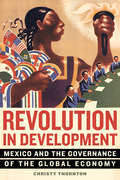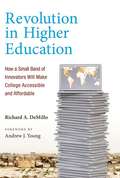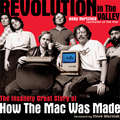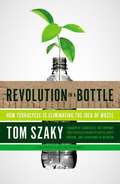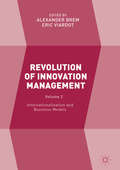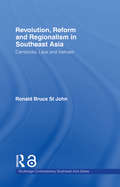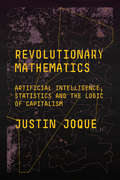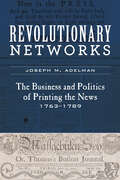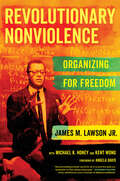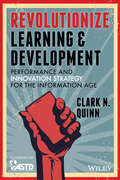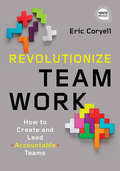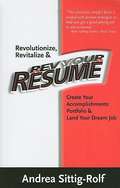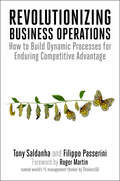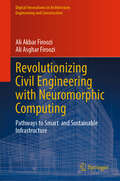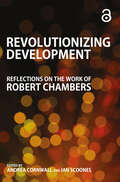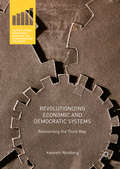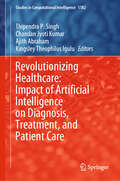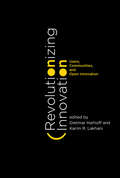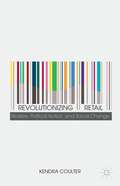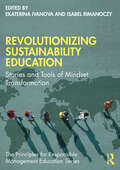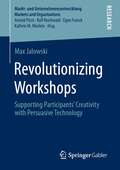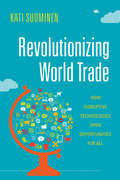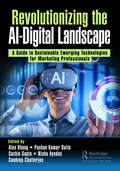- Table View
- List View
Revolution in Development: Mexico and the Governance of the Global Economy
by Christy ThorntonRevolution in Development uncovers the surprising influence of postrevolutionary Mexico on the twentieth century's most important international economic institutions. Drawing on extensive archival research in Mexico, the United States, and Great Britain, Christy Thornton meticulously traces how Mexican officials repeatedly rallied Third World leaders to campaign for representation in global organizations and redistribution through multilateral institutions. By decentering the United States and Europe in the history of global economic governance, Revolution in Development shows how Mexican economists, diplomats, and politicians fought for more than five decades to reform the rules and institutions of the global capitalist economy. In so doing, the book demonstrates, Mexican officials shaped not only their own domestic economic prospects but also the contours of the project of international development itself.
Revolution in Higher Education
by Richard A. DemilloColleges and universities have become increasingly costly, and, except for a handful of highly selective, elite institutions, unresponsive to twenty-first-century needs. But for the past few years, technology-fueled innovation has begun to transform higher education, introducing new ways to disseminate knowledge and better ways to learn -- all at lower cost. In this impassioned account, Richard DeMillo tells the behind-the-scenes story of these pioneering efforts and offers a roadmap for transforming higher education. Building on his earlier book, Abelard to Apple, DeMillo argues that the current system of higher education is clearly unsustainable. Colleges and universities are in financial crisis. Tuition rises inexorably. Graduates of reputable schools often fail to learn basic skills, and many cannot find suitable jobs. Meanwhile, student-loan default rates have soared while the elite Ivy and near-Ivy schools seem remote and irrelevant. Where are the revolutionaries who can save higher education? DeMillo's heroes are a small band of innovators who are bringing the revolution in technology to colleges and universities. DeMillo chronicles, among other things, the invention of MOOCs (Massive Open Online Courses) by professors at Stanford and MIT; Salman Khan's Khan Academy; the use of technology by struggling historically black colleges and universities to make learning more accessible; and the latest research on learning and the brain. He describes the revolution's goals and the entrenched hierarchical system it aims to overthrow; and he reframes the nature of the contract between society and its universities. The new institutions of a transformed higher education promise to demonstrate not only that education has value but also that it has values -- virtues for the common good.
Revolution in The Valley [Paperback]: The Insanely Great Story of How the Mac Was Made
by Andy HertzfeldThere was a time, not too long ago, when the typewriter and notebook ruled, and the computer as an everyday tool was simply a vision. Revolution in the Valley traces this vision back to its earliest roots: the hallways and backrooms of Apple, where the groundbreaking Macintosh computer was born. The book traces the development of the Macintosh, from its inception as an underground skunkworks project in 1979 to its triumphant introduction in 1984 and beyond.The stories in Revolution in the Valley come on extremely good authority. That's because author Andy Hertzfeld was a core member of the team that built the Macintosh system software, and a key creator of the Mac's radically new user interface software. One of the chosen few who worked with the mercurial Steve Jobs, you might call him the ultimate insider.When Revolution in the Valley begins, Hertzfeld is working on Apple's first attempt at a low-cost, consumer-oriented computer: the Apple II. He sees that Steve Jobs is luring some of the company's most brilliant innovators to work on a tiny research effort the Macintosh. Hertzfeld manages to make his way onto the Macintosh research team, and the rest is history.Through lavish illustrations, period photos, and Hertzfeld's vivid first-hand accounts, Revolution in the Valley reveals what it was like to be there at the birth of the personal computer revolution. The story comes to life through the book's portrait of the talented and often eccentric characters who made up the Macintosh team. Now, over 20 years later, millions of people are benefiting from the technical achievements of this determined and brilliant group of people.
Revolution in a Bottle: How Terracycle Is Eliminating the Idea of Waste
by Tom SzakyThe amazing story of what Inc. magazine called "the coolest little startup in America." <P> Tom Szaky dropped out of Princeton a decade ago to found TerraCycle, a company that makes the nonrecyclable recyclable. TerraCycle is now at the forefront of the eco-capitalist movement, partnering with more than 35 million people in twenty countries in the collection of waste and transforming that waste into useful products. Creating trash cans from chip bags and plastic benches from cigarette butts, TerraCycle has redefined recycling.<P> Revolution in a Bottle is a rollicking tale of entrepreneurial adventure and an essential guide to creating a company that's good for people, good for profits, and good for the planet.<P> Since Revolution in a Bottle was first published in 2009, TerraCycle has grown dramatically from a small company offering worm poop in a soda bottle to a pioneer of recycling worldwide. This completely revised and expanded edition continues the story of this incredible company.
Revolution of Innovation Management
by Eric Viardot Alexander BremThis edited volume explores how the rapid development of business model innovation changes innovation management at an international level. It discusses the next phases in its development, and the impact that this could have on the field. The authors identify and examine recent trends which have the potential to disrupt the traditional way of managing innovation, notably in terms of creativity, product development, and process change. In line with the constant globalization of innovation, the second volume ofRevolution of Innovation Management offers a variety of international perspective on these topics with illustrations and analysis coming from Asia, America, and Europe.
Revolution, Reform and Regionalism in Southeast Asia: Cambodia, Laos and Vietnam (Routledge Contemporary Southeast Asia Series #Vol. 8)
by Ronald Bruce St JohnBased on research carried out over the three decades, this book compares the post-war political economies of Cambodia, Laos and Vietnam in the context of their individual and collective impact on contemporary efforts at regional integration. The author highlights the different paths to reform taken by the three neighbours and the effect this has had on regional plans for economic development through the ASEAN and the Greater Mekong Subregion. Through its comparative analysis of the reforms implemented by Cambodia, Laos and Vietnam over the last thirty years, the book draws attention to parallel themes of continuity and change. The author discusses how the three states have demonstrated related characteristics whilst at the same time making different modifications in order to exploit the unique strengths of their individual cultures. Contributing to the contemporary debate over the role of democratic reform in promoting economic development, the book provides a detailed account of the political economies of three states at the heart of Southeast Asia.
Revolutionary Mathematics: Artificial Intelligence, Statistics and the Logic of Capitalism
by Justin JoqueTraces the revolution in statistics that gave rise to artificial intelligence and predictive algorithms refiguring contemporary capitalism.Our finances, politics, media, opportunities, information, shopping and knowledge production are mediated through algorithms and their statistical approaches to knowledge; increasingly, these methods form the organizational backbone of contemporary capitalism. Revolutionary Mathematics traces the revolution in statistics and probability that has quietly underwritten the explosion of machine learning, big data and predictive algorithms that now decide many aspects of our lives. Exploring shifts in the philosophical understanding of probability in the late twentieth century, Joque shows how this was not merely a technical change but a wholesale philosophical transformation in the production of knowledge and the extraction of value. This book provides a new and unique perspective on the dangers of allowing artificial intelligence and big data to manage society. It is essential reading for those who want to understand the underlying ideological and philosophical changes that have fueled the rise of algorithms and convinced so many to blindly trust their outputs, reshaping our current political and economic situation.
Revolutionary Networks: The Business and Politics of Printing the News, 1763–1789 (Studies in Early American Economy and Society from the Library Company of Philadelphia)
by Joseph M. AdelmanAn engrossing and powerful story about the influence of printers, who used their commercial and political connections to directly shape Revolutionary political ideology and mass mobilization.Honorable Mention, St. Louis Mercantile Library Prize, Bibliographical Society of AmericaDuring the American Revolution, printed material, including newspapers, pamphlets, almanacs, and broadsides, played a crucial role as a forum for public debate. In Revolutionary Networks, Joseph M. Adelman argues that printers—artisans who mingled with the elite but labored in a manual trade—used their commercial and political connections to directly shape Revolutionary political ideology and mass mobilization. Going into the printing offices of colonial America to explore how these documents were produced, Adelman shows how printers balanced their own political beliefs and interests alongside the commercial interests of their businesses, the customs of the printing trade, and the prevailing mood of their communities. Adelman describes how these laborers repackaged oral and manuscript compositions into printed works through which political news and opinion circulated. Drawing on a database of 756 printers active during the Revolutionary era, along with a rich collection of archival and printed sources, Adelman surveys printers' editorial strategies. Moving chronologically through the era of the American Revolution and to the war's aftermath, he details the development of the networks of printers and explains how they contributed to the process of creating first a revolution and then the new nation.By underscoring the important and intertwined roles of commercial and political interests in the development of Revolutionary rhetoric, this book essentially reframes our understanding of the American Revolution. Printers, Adelman argues, played a major role as mediators who determined what rhetoric to amplify and where to circulate it. Offering a unique perspective on the American Revolution and early American print culture, Revolutionary Networks reveals how these men and women managed political upheaval through a commercial lens.
Revolutionary Nonviolence: Organizing for Freedom
by James M. Lawson JrA persuasive account of the philosophy and power of nonviolence organizing, and a resource for building and sustaining effective social movements. Despite the rich history of nonviolent philosophy, many people today are unfamiliar with the basic principles and practices of nonviolence––even as these concepts have guided so many direct-action movements to overturn forms of racial apartheid, military and police violence, and dictatorships around the world. Revolutionary Nonviolence is a crucial resource on the long history of nonviolent philosophy through the teachings of Rev. James M. Lawson Jr., one of the great practitioners of revolution through deliberate and sustained nonviolence. His ongoing work demonstrates how we can overcome violence and oppression through organized direct action, presenting a powerful roadmap for a new generation of activists. Rev. Lawson’s work as a theologian, pastor, and social-change activist has inspired hope and liberation for more than sixty years. To hear and see him speak is to experience the power of the prophetic tradition in the African American and social gospel. In Revolutionary Nonviolence, Michael K. Honey and Kent Wong reflect on Rev. Lawson's talks and dialogues, from his speeches at the Nashville sit-in movement in 1960 to his lectures in the current UCLA curriculum. This volume provides a comprehensive introduction to Rev. Lawson's teachings on how to center nonviolence in successfully organizing for change.
Revolutionary Subjectivity in Post-Marxist Thought: Laclau, Negri, Badiou (Rethinking Political and International Theory)
by Oliver HarrisonSince the onset of the Global Financial Crisis the ideas of Karl Marx have once again become prominent in social and political thought. This book turns to Marx’s theory of revolutionary subjectivity as a means of assessing the work of three contemporary global theorists: Ernesto Laclau, Antonio Negri, and Alain Badiou, considered here together for the first time.
Revolutionize Learning & Development: Performance and Innovation Strategy for the Information Age
by Clark N. QuinnTransform learning and development practices to make your programs relevant and meaningful Existing training and development practices need a major overhaul. Learning and development practitioners and managers must increasingly face the fact that old methods are no longer relevant in today's tech-savvy world and, in many cases, they simply don't work. In Revolutionize Learning and Development, you'll get a straightforward look at how people really learn and get introduced to practical steps for rethinking, redesigning, and reestablishing learning delivery. This book shows you how to take advantage of new understandings and new technologies so you can make a meaningful impact on your organization. In four sections, the book lays out crucial background knowledge, conceptual frameworks, and practical steps for transforming learning and development so that it has the greatest return for businesses. Managers, practitioners, and executives will benefit from the illustrations, vignettes, and sidebars that highlight the author's advice and expertise. Learn to avoid the pitfalls of outdated and irrelevant learning solutions, including those that ignore the importance of clear objectives, proper execution, and thorough evaluation Discover the practical steps for implementing the best and most effective strategies for making the most of training programs Benefit from a thorough examination of what happens when managers and practitioners make major changes in strategy, leadership, and technology Get familiar with the roles of research-based frameworks, performance support, and informal learning Don't let learning and development myths derail you. Find out how to breathe new life into your programs with practical guidance designed to inspire today's best learning technology solutions.
Revolutionize Teamwork: How to Create and Lead Accountable Teams (Ignite Reads)
by Eric CoryellIs your team creating revolutionary results?Taking a page from Facebook, Eric Coryell has developed a teamwork model that creates trust, success, and true accountability. How? By redefining your team's model to be customer facing as opposed to reporting up! Revolutionize Teamwork is a quick read packed with valuable information that shows you how to create and lead accountable teams built on shared trust. Using the principles Eric outlines in this book leads to teams that are better able to make decisions and are motivated by group success.
Revolutionize, Revitalize and Rev Your Résumé: Create Your Accomplishments Portfolio and Land Your Dream Job
by Andrea Sittig-RolfRevolutionize, Revitalize and Rev Your Résumé is a compelling collection of strategic résumé building and interview scheduling techniques that have proven effective at empowering job seekers to shine and rise above other applicants when applying for the ever elusive dream job.
Revolutionizing Business Operations: How to Build Dynamic Processes for Enduring Competitive Advantage
by Tony Saldanha Filippo PasseriniDon't risk the dire consequences of your work processes becoming obsolete-discover a powerful model for constant, ongoing, enterprise-wide process evolution and optimization.If you have a great product, but don't have the operations in place to efficiently and effectively support it-production, manufacturing, sales, finance, human resources, etc.-you won't succeed. Product innovation is seen as flashier and so gets far more attention, but you can create an enduring competitive advantage by revolutionizing business operations. The problem is most attempts to improve business operations are reactive, sporadic, and siloed. Tony Saldanha and Filippo Passerini's Dynamic Process Transformation model provides a living model for constant, ongoing process evolution and optimization. The authors focus on maximizing three drivers of change. First, open market rules-each business process must be run as a separate business, instead of via monolithic mandates coming down from on high. Second, there must be unified accountability- outcomes must be clear and consistent across the company, instead of being siloed within departments. And third, there needs to be a dynamic operating engine, a methodology to convert the constantly changing business process goals into tactical day-to-day employee actions.With numerous examples from leading companies, this book shows how to proactively keep business processes across the company from becoming obsolete and take advantage of a neglected key to success.
Revolutionizing Civil Engineering with Neuromorphic Computing: Pathways to Smart and Sustainable Infrastructure (Digital Innovations in Architecture, Engineering and Construction)
by Ali Akbar Firoozi Ali Asghar FirooziThis book delves into the transformative potential of neuromorphic computing within the realm of civil engineering, emphasizing its role in advancing smart infrastructure systems. Neuromorphic computing, inspired by the neural structures of the human brain, offers unparalleled efficiencies in processing complex, dynamic data sets, thereby facilitating real time decision-making and predictive analytics in infrastructure management. Through a comprehensive exploration of emerging circuits, memory technologies, intelligent learning algorithms, and application-driven systems, it illustrates how neuromorphic computing can significantly enhance the resilience, efficiency, and sustainability of urban infrastructure. The book further addresses the challenges, ethical considerations, and future directions associated with the integration of these advanced technologies into civil engineering projects. Through detailed case studies, it provides insights into successful implementation strategies, risk management, and contingency planning, underscoring the importance of ethical design and development. This book serves as a valuable resource for practitioners, researchers, and policymakers involved in the evolution of civil engineering toward smarter, more responsive, and sustainable urban environments.
Revolutionizing Development: Reflections on the Work of Robert Chambers
by Andrea Cornwall; Ian ScoonesThis book tells the story of development studies in practice over the last fifty years through the work of one remarkable individual, Robert Chambers. His work has taken him from being a colonial officer in Kenya through training and managing large rural development projects to a fundamental critique of top-down development and the championing of participatory approaches. The contributors eloquently demonstrate how he has been at the centre of major shifts in development thinking and practice over this period, popularising terms that are now at the centre of the development lexicon such as vulnerability, multi-dimensional poverty, sustainable livelihoods and 'farmer first'. Robert Chambers played a major role in the massive growth in participatory approaches to development, and particularly the application of participatory methods in development research and appraisal. This has led to fundamental challenges to development practice, ranging from approaches to monitoring and evaluation to institutional learning and professional training. There is probably no-one who has had more influence on approaches to development in the past decades. Revolutionizing Development offers a unique overview of these contributions in thirty-two concise chapters from authors who have been intimately involved as collaborators, critics and colleagues of Robert Chambers.
Revolutionizing Economic and Democratic Systems
by Kenneth NordbergThis book responds to an increasingly pluricentric, reflexive, and flexible society as a result of globalization and economic liberation from the bureaucratic-political system. The third industrial revolution saw citizens, companies, and the economy acting in functional networks rather than in static ones, making top-down governing ever more difficult. Despite this, society systems created in the wake of the second industrial revolution linger on and must adapt to the globalized, digitized reality in order to stay necessary and relevant. Through a theoretical discussion and four empirical cases studying governance and innovation systems, this volume is the first to describe the causes behind the impasse Western society seems to find itself in and suggests inclusive economic and democratic structures working in a bottom-up fashion as a way out. By understanding local circumstances as well as the innovative power of inclusive and participative structures, we can begin to pave the way to legitimate governance and growth. This book adds to the academic literature on democracy, governance, economy, and innovation systems for researchers and scholars of political science, social science, and economics.
Revolutionizing Fashion and Retail: Proceedings of the Fifth fashionXrecsys Workshop at the Recommender Systems Conference, Singapore, 18th-22nd September 2023 (Lecture Notes in Electrical Engineering #1299)
by Nima Dokoohaki Reza Shirvany Julia LaserreThis book presents the proceedings from the Fifth Workshop on Recommender Systems in Fashion and Retail (2023), highlighting the latest advances in AI-driven technologies for e-commerce, retail, and fashion. With contributions from leading academic and industry researchers, it explores how AI-powered recommender systems address key challenges and enable innovations in personalization and beauty, size and fit recommendations, and helping brands deliver more tailored and engaging shopping experiences.
Revolutionizing Healthcare: Impact of Artificial Intelligence on Diagnosis, Treatment, and Patient Care (Studies in Computational Intelligence #1182)
by Ajith Abraham Thipendra P. Singh Chandan Jyoti Kumar Kingsley Theophilus IguluThis book explores the transformative role of artificial intelligence (AI) in healthcare, emphasizing its shift from a futuristic concept to an essential part of modern medical systems. The articles cover a range of AI applications, from disease diagnosis and drug design to patient engagement and mental health treatment. Advances in machine learning (ML) and deep learning (DL) technologies have opened new possibilities for diagnosing complex conditions, with examples like predictive analysis for health risks and early diagnosis of diseases such as breast cancer and diabetic retinopathy. Additionally, AI's role in treating mental health disorders is highlighted. While AI offers vast benefits, the book stresses the importance of ethical considerations, such as patient privacy and equitable access. It also addresses challenges in integrating AI within existing healthcare systems, underscoring collaboration among stakeholders as crucial. This book ultimately provides a comprehensive look at AI’s potential to reshape healthcare.
Revolutionizing Innovation: Users, Communities, and Open Innovation
by Karim R. Lakhani Dietmar HarhoffA comprehensive and multidisciplinary view of the emerging paradigm of user and open innovation, offering both theoretical and empirical perspectives.The last two decades have witnessed an extraordinary growth of new models of managing and organizing the innovation process that emphasizes users over producers. Large parts of the knowledge economy now routinely rely on users, communities, and open innovation approaches to solve important technological and organizational problems. This view of innovation, pioneered by the economist Eric von Hippel, counters the dominant paradigm, which cast the profit-seeking incentives of firms as the main driver of technical change. In a series of influential writings, von Hippel and colleagues found empirical evidence that flatly contradicted the producer-centered model of innovation. Since then, the study of user-driven innovation has continued and expanded, with further empirical exploration of a distributed model of innovation that includes communities and platforms in a variety of contexts and with the development of theory to explain the economic underpinnings of this still emerging paradigm. This volume provides a comprehensive and multidisciplinary view of the field of user and open innovation, reflecting advances in the field over the last several decades. The contributors—including many colleagues of Eric von Hippel—offer both theoretical and empirical perspectives from such diverse fields as economics, the history of science and technology, law, management, and policy. The empirical contexts for their studies range from household goods to financial services. After discussing the fundamentals of user innovation, the contributors cover communities and innovation; legal aspects of user and community innovation; new roles for user innovators; user interactions with firms; and user innovation in practice, describing experiments, toolkits, and crowdsourcing, and crowdfunding. Contributors Efe Aksuyek, Yochai Benkler, James Bessen, Jörn H. Block, Annika Bock, Helena Canhão, Jeroen P. J. de Jong, Emmanuelle Fauchart, Dominique Foray, Nikolaus Franke, Johann Füller, Helena Garriga, Fred Gault, Fredrik Hacklin, Dietmar Harhoff, Joachim Henkel, Cornelius Herstatt, Christoph Hienerth, Venkat Kuppuswamy, Karim R. Lakhani, Christopher Lettl, Christian Lüthje, Ethan Mollick, Hidehiko Nishikawa, Alessandro Nuvolari, Susumu Ogawa, Pedro Oliveira, Stefan Perkmann Berger, Frank Piller, Christina Raasch, Susanne Roiser, Fabrizio Salvador, Pamela Samuelson, Tim Schweisfurth, Sonali K. Shah, Christoph Stockstrom, Katherine J. Strandburg, Stefan Thomke, Andrew W. Torrance, Mary Tripsas, Georg von Krogh
Revolutionizing Retail
by Kendra CoulterThere is a modest but growing body of scholarly literature on experiences of retail work, with only a handful of studies existing on retail organizing. Before Revolutionizing Retail, no scholar had captured or analysed the breadth of political action being pursued in this crucial economic sector.
Revolutionizing Sustainability Education: Stories and Tools of Mindset Transformation (The Principles for Responsible Management Education Series)
by Ekaterina Ivanova and Isabel RimanoczyThere is growing awareness among leading responsible management scholars and practitioners that understanding global wicked problems is insufficient in effecting lasting engagement and changed behaviors. Research indicates that to impact behavior, the mindset has to shift, which leaves the question: How do you shift a mindset? This book guides educators and practitioners, their students and colleagues to take action on finding urgent solutions to the grand challenges stated in the 17 UN Sustainable Development Goals. A Sustainability Mindset is a way of thinking and being that results from a broad understanding of the ecosystem, from social sensitivity and an introspective focus on our personal values and higher self, which finds its expression in actions for the greater good. By promoting a mindset shift, educators in very diverse contexts are laying the foundation for a resilient future. The book presents a collection of over 150 student voices depicting a transformative experience and a shift in their mindset. Seventeen educator/student teams of contributing authors from across five continents describe the activity that prompted those students’ reflections, and the conceptual frameworks that played a role in the selection of the learning goals and activities. The book is written with academic and corporate educators, reflective practitioners, consultants, coaches, trainers and students in mind, and is invaluable in guiding the process of developing a sustainability mindset among participants in the training process.
Revolutionizing Workshops: Supporting Participants’ Creativity with Persuasive Technology (Markt- und Unternehmensentwicklung Markets and Organisations)
by Max JalowskiDr. Max Jalowski designs strategies for revolutionizing workshops by introducing persuasive technology.His results show that investigating the behavior of participants in design workshops offers various application potentials for persuasive technology. He presents scenarios how established persuasive technologies can be used in participatory design and how new technologies can be designed. Furthermore, he presents four artifacts for the application in workshopswhich contribute to the generation of design knowledge. Finally,he derives design principles to support future applications and research.About the authorDr. Max Jalowski is a postdoctoral researcher at Friedrich-Alexander-Universität Erlangen-Nürnberg (FAU), Department of Information Systems, Chair of Information Systems – Innovation and Value Creation (Prof. Dr. Kathrin M. Möslein). His research focuses ondesigningtechnologies, persuasive technology, user behavior in creativeprocesses and digital innovation.
Revolutionizing World Trade: How Disruptive Technologies Open Opportunities for All (Emerging Frontiers in the Global Economy)
by Kati SuominenAlmost 15 years ago, in The World is Flat, Thomas Friedman popularized the latest wave of globalization as a world of giant corporate supply chains that tripled world trade between 1990 and 2010. Major corporations such as Apple, Dell, and GE offshored manufacturing to low-cost economies; China became the world's factory, mass-producing and exporting computers and gadgets to Western shoppers. This paradigm of globalization has dominated global trade policy-making and guided hundreds of billions of dollars in business investments and development spending for almost three decades. But we are now on the cusp of a new era. Revolutionizing World Trade argues that technologies such as ecommerce, 3D printing, 5G, the Cloud, blockchain, and artificial intelligence are revolutionizing the economics of trade and global production, empowering businesses of all sizes to make, move, and market products and services worldwide and with greater ease than ever before. The twin forces of digitization and trade are changing the patterns, players, politics, and possibilities of world trade, and can reinvigorate global productivity growth. However, new policy challenges and old regulatory frameworks are stifling the promise of this most dynamic, prosperous, and inclusive wave of globalization yet. This book uses new empirical evidence and policy experiences to examine the clash between emerging possibilities in world trade and outdated policies and institutions, offering several policy recommendations for navigating these obstacles to catalyze growth and development around the world.
Revolutionizing the AI-Digital Landscape: A Guide to Sustainable Emerging Technologies for Marketing Professionals
by Alex Khang, Pushan Kumar Dutta, Sachin Gupta, Nishu Aayedee, and Sandeep ChatterjeeThis book investigates the growing influence of artificial intelligence in the marketing sphere providing insights into how AI can be harnessed for developing more effective and efficient marketing strategies.In addition, the book offers a comprehensive overview of the various digital marketing tools available to entrepreneurs, discussing their features, benefits, and potential drawbacks. This helps entrepreneurs make well-informed decisions when selecting the tools most suited to their needs and objectives. It is designed to help entrepreneurs develop and implement successful strategies, leveraging the latest tools and technologies to achieve their business goals.As the digital landscape continues to evolve rapidly, this book serves as a valuable resource for entrepreneurs looking to stay ahead of the curve and capitalize on new opportunities. The book's scope encompasses many topics, including customer experience, content marketing, AI strategy, and digital marketing tools.
